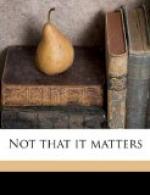I thought of these things last Monday, and definitely renounced the idea of becoming a grocer; and as I wandered round the bookstall, thinking, I came across a little book, sixpence in cloth, a shilling in leather, called Proverbs and Maxims. It contained some thousands of the best thoughts in all languages, such as have guided men along the path of truth since the beginning of the world, from “What ho, she bumps!” to “Ich dien,” and more. The thought occurred to me that an interesting article might be extracted from it, so I bought the book. Unfortunately enough I left it in the train before I had time to master it. I shall be at the bookstall next Monday and I shall have to buy another copy. That will be all right; you shan’t miss it.
But I am wondering now what the bookstall clerk will make of me. A man who keeps on buying Proverbs and Maxims. Well, as I say, they see life.
“Who’s Who”
I like my novels long. When I had read three pages of this one I glanced at the end, and found to my delight that there were two thousand seven hundred and twenty-five pages more to come. I returned with a sigh of pleasure to page 4. I was just at the place where Leslie Patrick Abercrombie wins the prize “for laying out Prestatyn,” some local wrestler, presumably, who had challenged the crowd at a country fair. After laying him out, Abercrombie returns to his books and becomes editor of the Town Planning Review. A wonderfully drawn character.
The plot of this oddly named novel is too complicated to describe at length. It opens with the conferment of the C.M.G. on Kuli Khan Abbas in 1903, an incident of which the anonymous author might have made a good deal more, and closes with a brief description of the Rev. Samuel Marinus Zwemer’s home in New York City; but much has happened in the meanwhile. Thousands of characters have made their brief appearance on the stage, and have been hustled off to make room for others, but so unerringly are they drawn that we feel that we are in the presence of living people. Take Colette Willy, for example, who comes in on page 2656 at a time when the denouement is clearly at hand. The author, who is working up to his great scene —the appointment of Dr. Norman Wilsmore to the International Commission for the Publication of Annual Tables of Physical and Chemical Constants— draws her for us in a few lightning touches. She is “authoress, actress.” She has written two little books: Dialogue de Betes and La Retraite Sentimentale. That is all. But is it not




